|
|
Working Group I discussed Commitment 9, on resource
allocation, and Commitment 7, on accelerated development in Africa
and the LDCs.
|
Chair Maquieira
consults with the G-77/China
In 87 (a),
on implementing debt relief consistent with the HIPC initiative,
the G-77/China supported a Norwegian proposal amended by the EU
on "innovative" debt relief initiatives for LDCs and proposed
reference to debt cancellation. Japan and the US objected. The
text remains bracketed. The G-77/China proposed a World Solidarity
Fund to alleviate poverty.
|
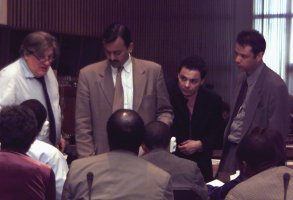
|
|
Working Group II discussed Commitment 2, eradicating
poverty through decisive national actions and international cooperationon
resource allocation, and Commitment 4, on promoting social integration
|
|
|
The EU consults
with Sudan and Algeria
On 27 bis
(i) on the informal sector, the EU deferred discussion on safeguarding
and promoting respect for basic workers' rights. The G-77/China
opposed, and delegates left bracketed, Canadian text on promoting
the balance of employment and family responsibilities.
|
Egypt and
Nigeria
Considering
a Chair's reformulation of EU-proposed 27 bis, the G-77/CHINA
could not accept reference to "meso-level" in addressing capacity
and institution building. The paragraph remains bracketed.
. In paragraph 27, on national strategies for a multi-sectoral
approach to poverty eradication, the G-77/CHINA accepted EU proposals
to, inter alia: delete reference to all relevant government ministries
and departments. The paragraph was agreed.
|
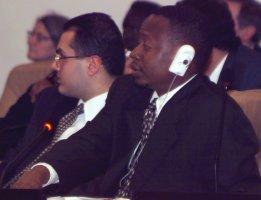
|
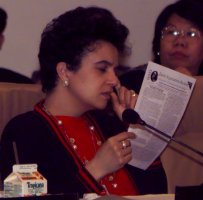 |
Algeria reading
the daily ENB.
The
Canadian delegate (right) intervenes on 27 bis (i) on the
informal sector.
|
|
|
Norway
in Working Group II
|
|
|
|
Nigeria (left)
speaks with NGOs
|
|
Julian
Disney, President, International Council on Social Welfare, and
Chair Maquieira
|
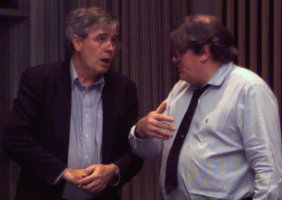
|
|
Further Initiatives in Overcoming
Poverty in Partnership with the Poorest
This
side event was sponsored by the Division for Social Policy and Development
|
 Quyen
Tran, International Movement ATD Fourth World
Quyen
Tran, International Movement ATD Fourth World
He described
some of the conditions conducive to full partnership with the
poorest, including development projects based on aspirations of
the poor, opportunities for the poor to renew their creativity,
and participation in social and political action. He also outlined
conditions necessary for sustainable partnerships with the poor,
including time and mutual trust, strengthening the family unit,
reciprocity, and participation in project evaluation. He then
highlighted two further initiatives: leadership in the commitment
to fight poverty; and the establishment of a working group to
study the feasibility of a Convention on Overcoming Human Poverty.
|
|
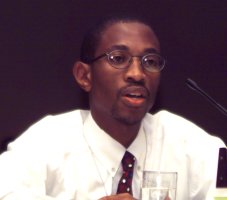 |
 Tirro
Holele, Department of Welfare and Population Development, South
Africa
Tirro
Holele, Department of Welfare and Population Development, South
Africa
He
described the Speak Out on Poverty Hearings in South Africa, where
the poor spoke out on what poverty means to them. Problems raised
were referred to the appropriate organizations. Over 10,000 people
participated in the entire process in various capacities. Testimonies
provided ample evidence of the ingenuity and creativity of people.
Gender, disability and crime each emerged as affecting vulnerability
of people ot poverty.
|
|
 Ambassador
Ruth Jacoby, Sweden
Ambassador
Ruth Jacoby, Sweden
Ambassador
Jacoby discussed how donor countries can contribute to the eradication
of poverty. She highlighted outcomes from a Swedish report "The
Rights of the Poor." She stressed that poverty is not only
lack of material resources, but it is also exclusion from fundamental
human rights. She emphasized support for programmes designed by
the partner countries themselves. She said the proposal to work
for a legally binding convention to overcome human poverty merited
further study.
|
|
|
Mental Health: Forging Linkages to Social
Development
|
|
Moderator
Corann Okorodudu, Ed.D., American Psychological Association and
Society for the Psychological Study of Social Issues, Pablo Sadler,
M.D., World Association for Psychosocial Rehabilitation who spoke
on A human rights perspective on mental health and social development,
Ricki Kantrowitz, Ph.D., World Federation for Mental Health, discussed
Gender, mental health and social development, Chris Stout, Ph.D.,
Society for the Psychological Study of Social Issues, addressed
Developing sustainable partnerships to promote mental health and
social development, and Nancy Wallace, NGO Committee on Mental Health.
Not pictured: Richard Donahue, World Federation for Mental Health,
discussed Psychosocial well-being and social development, and Joseph
DeMeyer, Ph.D., Society for the Psychological Study of Social Issues,
addressed Implications of the mental health of refugees and displaced
persons for social development
|
|
.Nancy
Wallace, Chair, NGO Committee on Mental Health, Conference of NGOs
in consultative status with ECOSOC, discussed the importance of
and ways to increase dialogue on and attention given to the issue
of mental health at the intergovernmental level within the UN system
and at the country level
|
|
|
Life after Debt: The South Speaks
This
event, sponsored by the NGO Subcommittee on the Eradication of Poverty
and the Caucus on Eradication of Poverty for the Geneva 2000 Special
Session, provided a dialogue on debt cancellation from the Southern
perspective.
|
|
Raj
Bardoville, Senior Economist, Office of the Special Coordinator
for Africa and the Least Developed States (OSCAL), gave a a technical
presentation on financial structures relating to debt financing
and payments along with a brief clear analysis of the the reality
of the dire effects of unpayable debts on the poor and the urgent
need to cancel the debts and increase ODA.
|
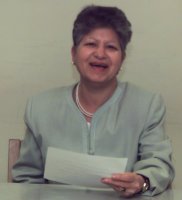 |

 Linkages Coverage of the World Summit for Social Development in Copenhagen
Linkages Coverage of the World Summit for Social Development in Copenhagen
 A summary of the major issues
A summary of the major issues
 Agenda for the Second Session of the PrepCom
Agenda for the Second Session of the PrepCom
 Secretariat web site with official
documents and information
for NGO participants
Secretariat web site with official
documents and information
for NGO participants
 Secretary-general's
Report on the Implementation of the Outcome of the WSSD
Secretary-general's
Report on the Implementation of the Outcome of the WSSD
 Summary
of the WSSD agreements
Summary
of the WSSD agreements
 Information on the WSSD+5 Special Session
Information on the WSSD+5 Special Session

|